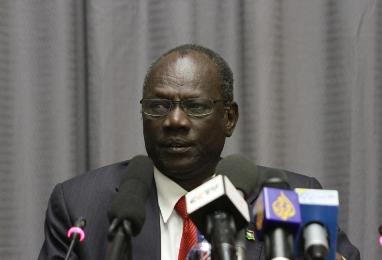S. Sudan says proposed roles of prime minister delayed peace talks
October 7, 2014 (JUBA) – South Sudanese government delegates to peace talks in Ethiopia said on Tuesday that disagreement over what powers a prime minister would be granted led to the postponement of negotiations for further consultations.

“Despite the fact that there were some other outstanding issues that needed to be addressed – the most important of which is [the] powers of the prime minister, whose position was created in the protocol,” said Lueth while flanked by fellow government delegates to the Ethiopian town of Bahir Dar, about 500km from Addis Ababa.
“The question of [the] competence of the prime minister has all the times been an obstacle because in terms of governance, definitely, you start with the office of the president and the other offices, including the office of the prime minister,” he added.
Mediators from the Intergovernmental Authority on Development (IGAD), which is mediating peace talks between the country’s warring parties, announced that talks would be adjourned until 16 October when both sides have had the chance to hold consultations with president Salva Kiir and rebel leader Riek Machar.
The latest round of talks have been lauded as progressive, although both sides failed to agree on powers of the president and the prime minister.
The government delegation maintains that the president should remain the head of state and government, while the opposition has called for the president to be a ceremonial head of state only.
Lueth, however, described the opposition’s demands as rocky.
“[If the prime minister is the head of government], then he is more powerful than the president,” he said.
Lueth said the government’s demand to replace IGAD chief mediator Seyoum Mesfin is “still holding”.
“The question of the change of venue and even the change of mediation is still holding. We have raised this. It is not me or the [government] delegation that would demand it, but [it] will have to be decided by the IGAD heads of states and governments because they are the very people who decided the mediators from 27 December 2013,” he said.
Lueth came under pressure from opposition party leaders last week for attacking IGAD and the Troika countries of the US, Norway and UK for being biased, accuseing them of breeding regime change in South Sudan.
Last week, Lueth was quoted as saying that Mesfin favours the opposition and that his views cast doubt on the neutrality of his position in talks.
The minster said that while both sides had agreed on the introduction of a federal system of governance, but that discussion were still ongoing, suggesting that the proposed interim government of national unity may decide to implement federalism.
IGAD gave both sides a 45-day ultimatum to form a transitional government, with the deadline due to expire in mid-October.
Lueth said that both the government and rebel forces never requested that discussions be halted or the ultimatum period muted.
“We did not demand the recess. It is the mediators who decided it and from the 4 [October],” he said, adding that the adjournment would not be deducted the 45-day period.
(ST)
